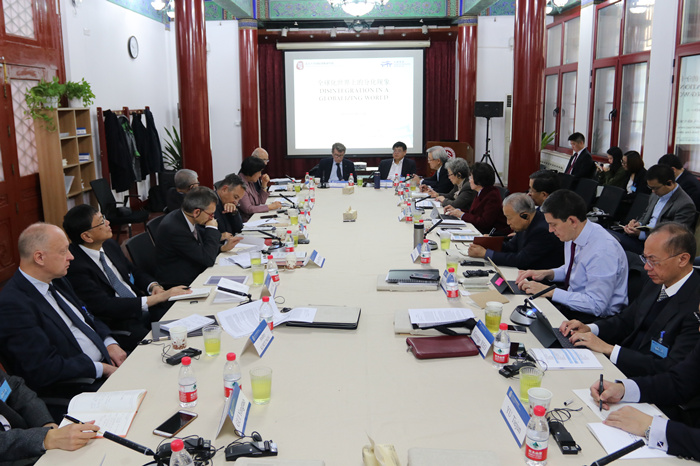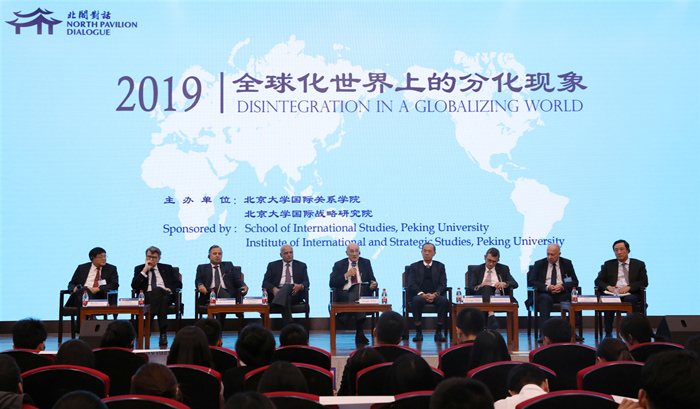
From October 29th to 31st, 2019, the Sixth Annual Meeting “North Pavilion Dialogue” was held in Peking University (PKU). The “North Pavilion Dialogue” is an event hosted by the Institute of International and Strategic Studies (IISS), PKU and has been fully supported by the leaders of PKU and the School of International Studies, PKU. Under the framework of this meeting, former domestic and foreign politicians and well-known experts with rich political experience, profound academic accomplishments and far-reaching strategic visions are annually invited to PKU to discuss international situation and the prospects of world politics.
Entitled “Disintegration in a Globalizing World”, “North Pavilion Dialogue” in this year focused on exploring the causes and manifestations of the world’s growing disintegration and states’ responding to it. Technological progress and the development of economic globalization have not only promoted the prosperity of the world economy, but exacerbated the global social and economic inequalities as well. At the same time, large-scale population flows have given rise to the emergence and prominence of identity politics; nationalism, along with populism, has been on the rise across the world, and political introversion has prevailed in all countries. In addition, multi-level reasons, such as changes in strength among big powers, poor domestic governance in some countries, and the traits of political leaders, have produced a trend of continuous disintegration and division in world politics in recent years. The global order, comprised of world power structure and governance rules, is undergoing major changes. Under such circumstance, the intensified strategic competition between China and the United States is particularly eye-catching. The intense competition in high-tech fields and trade disputes that have lasted for many years and might become a new feature of Sino-U.S. relations in the future. European countries, Russia, Japan, India, Australia, South Korea, and ASEAN countries have been worried about the negative consequences of Sino-U.S. strategic game and the dilemma which they might have to “select one side” in the future.
In terms of regional perspective, the Asia-Pacific region has become the focus of big powers’ game, which brings uncertainty to regional security. Sino-Japanese relations have improved, while the foundation still fragile. The Japan-South Korea relationship has encountered sudden changes with the nuclear issue on the Korean Peninsula remaining unsettled and the South China Sea and Taiwan issues still being a potential outbreak. Facing with security challenges in these regions, it has been the right time to construct the Asia-Pacific security community, being a part of the community with shared future for mankind. In Europe, the UK is deeply mired in the “Brexit” political stalemate and the refugee crisis continues to ferment. These things makes the EU’s development prospects attract international attention. The Middle East is still fragmented. It’s numerous internal and external conflicts hardly prognoses an optimistic future. In the increasingly turbulent world, such stability factors as the sense of responsibility of great powers, consciousness of rules, consciousness of fair competition, diplomatic quality and national leadership are gaining ever growing importance. With the principle of seeking common ground while reserving differences, joint efforts of the international community should be directed towards establishment of an international security system based on multilateralism, common security and cooperative security, promotion of further development of a fair, reciprocal, open and common rule-based free trade system. At the same time, strengthening cooperation among all parties in their responses to common challenges faced by mankind, such as the environmental, climate change, and other challenges should also be prioritized.
Twelve foreign guests were invited this year: Kevin Rudd, Former Prime Minister of Australia, Joseph Nye, Jr., Former Assistant Secretary of Defense of the United States, Former Chair of the National Intelligence Council of the United States, David Miliband, Former Foreign Secretary of the United Kingdom, Shivshankar Menon, Former National Security Advisor to the Prime Minister of India, Nabil Fahmy, Former Minister of Foreign Affairs of Egypt, Yoriko Kawaguchi, Former Minister of Foreign Affairs of Japan, Kim Sung-Hwan, Former Minister of Foreign Affairs and Trade of the Republic of Korea, George Yeo, Former Minister of Foreign Affairs of Singapore, Andrey Kortunov, Director General of the Russian International Affairs Council, Volker Perthes, Executive Chairman and Director of Stiftung Wissenschaft und Politik, Thierry de Montbrial, President of French Institute of International Relations (IFRI), and Paul Haenle, Carnegie-Tsinghua Center for Global Policy, Maurice R. Greenberg Director’s Chair.
Dai Bingguo, former State Councilor of China, attended the meeting. He had an in-depth conversation with the foreign guests and made a concluding speech. Such distinguished domestic guests as Fu Ying, Chairperson for Center of International Security and Strategy, Tsinghua University, Chen Xiaogong, Former Deputy Director, Foreign Affairs Office of the CPC Central Committee, Lieutenant General (retired), Former Deputy Commander of the China Air Force, Yao Yunzhu, Major General (retired), Academy of Military Science, People’s Liberation Army of China, former Director Emeritus of the Center on China-American Defense Relations, Yan Xuetong, Dean of the Institute of International Relations, Tsinghua University, Qiao Yide, Vice Chairman and Secretary General, Shanghai Development Research Foundation, and Wang Yizhou, Professor, School of International Studies, Peking University ,attended the annual meeting on invitation. Wang Jisi, President, Institute of International and Strategic Studies, Peking University, Yuan Ming, Vice President, Guan Guihai, Executive Vice President, Yu Tiejun, Vice President, Gui Yongtao, Vice President and Wu Bingbing, Senior Research Fellow, Institute of International and Strategic Studies also participated in the meeting.
The Annual Meeting was comprised of one-and-half-day closed-door seminar and a half-day open forum. During the closed-door seminar, participants focused on discussing major strategies and hot issues, such as whether the world is moving towards turmoil and fragmentation, the positioning and future of Asia, the disintegration forces in Europe and the Middle East, whether China and the United States may achieve “decoupling” at the economic and technological level in the future, and the changing global order; as a result of fruitful discussions many valuable ideas and suggestions were provided.

On the afternoon of October 31st, the School of International Studies and IISS, PKU co-organized an open forum on “Disintegration in a Globalizing World” where guests, such as Joseph Nye, Jr., Thierry de Montbrial, Andrey Kortunov, Volker Perthes, Nabil Fahmy, Shivshankar Menon, George Yeo and Wang Yizhou, had heated discussion on the theme of the meeting and interacted actively with the audience.
In addition, the IISS invited some of the international guests to give several lectures. On the afternoon of October 29th, Kim Sung-Hwan, former Minister of Foreign Affairs and Trade of the Republic of Korea gave a lecture entitled “Is regional security architecture in Northeast Asia possible?” at the North Pavilion of PKU.
On the morning of November 1st, Andrey Kortunov, Director General of the Russian International Affairs Council gave a lecture entitled “The coming U.S.-China competition: what does it mean for Russia?” at the North Pavilion of PKU.
The Institute of International and Strategic Studies (IISS), Peking University (PKU) was officially founded in October 2013, with Dai Bingguo, former State Councilor of China, as its honorary president. Under the leadership of PKU and thanks to the rich intellectual resources of the School of International Studies and other relevant departments of PKU, IISS undertakes research tasks mandated by government departments and enterprises, and it is engaged in providing high-quality consulting services on China’s international strategy and foreign policy and has established close partnership with representative think tanks and academic institutions around the world.
From 2014 on, IISS, PKU holds the “North Pavilion Dialogue” annually. This is one of the initiatives of PKU to implement General Secretary Xi Jinping’s instruction on “building new type of think tanks with Chinese characteristics”. IISS aims to develop the “North Pavilion Dialogue” into a high-profile platform to facilitate exchanges and cooperation among domestic and foreign peers in the international strategic community and enable them to explore and make accurate judgments on the world situation, help China play its international role and promote win-win cooperation and inclusive development in global politics.
The “North Pavilion” of the “North Pavilion Dialogue”, formerly known as the Luella Miner Pavilion, is located in the central part of the scenic Yan Yuan Garden and now accommodates the office of IISS.
Editor:LI Fangqi Photographers:Zheng Peijie, Lin Huazhao

